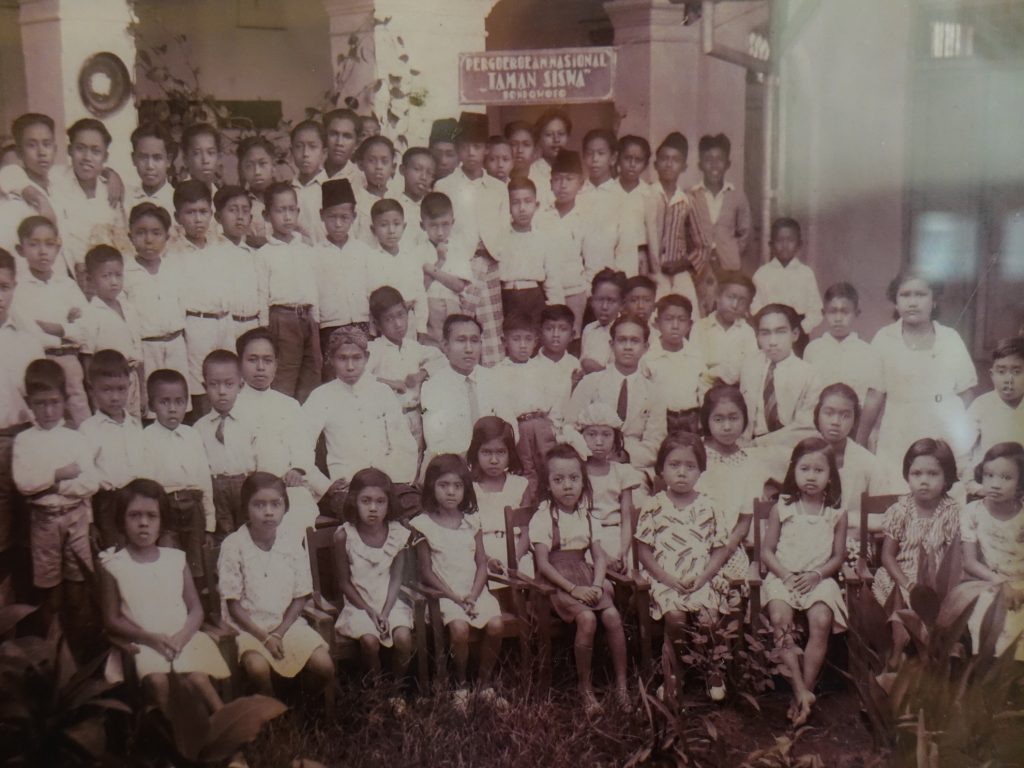Browse

Founded in 1922 in Yogyakarta, Indonesia, Taman Siswa was an alternative school to the Dutch colonial education system. Its teaching method is called “Among” (in Javanese means ‘education’), which aims at cultivating students to move according to their natural character, maintaining freedom, peace and order of their body and soul. As such, the school not only taught general subjects such as language, science and economics but also traditional Javanese music and art. Taman Siswa did not set the pursuit of knowledge and enlightenment as its ultimate goal; rather, it simultaneously stressed the importance of feeling, thinking and experiencing in the process of developing nationalism, personality and culture. The founder of Taman Siswa, Ki Hadjar Dewantara, came from a royal family. He used to be a radical nationalist leader before being sentenced to exile in the Netherlands by the Dutch colonial government in 1913. At there, he developed interests in education, and was particularly inspired by the kinds of system established by Montessori and Tagore. The establishment of Taman Siswa was the result after his return to the homeland. Taman Siswa’s philosophy is to see the school as a family, in where students learn spontaneously. Ki Hadjar integrated the system of East and West, created a unique alternative school which once gathered the most progressive nationalists and modern Indonesian artists. More importantly, Taman Siswa was among the first school that gave equal opportunity for women to go to school and become teachers. However, during the post-independence period, Taman Siswa had been engaging a tug of war between the debates of “traditional education” and “national education”. What position should the school take to preserve its uniqueness during the postcolonial period? Decades later, contemporary Yogyakarta is home to alternative art and cultural spaces. They more or less, like Taman Siswa, look for autonomous, independent space outside the authoritative education system. In 2016, Kunci Cultural Studies Center (est.1999) founded a “School of Improper Education” (it was named ‘Sekolah Salah Didik’ in the Indonesian language, which literally means ‘school of wrong education’). It invites participants to learn “how to learn” together. Kunci’s method is said to be inspired by Taman Siswa, and they seek to experiment the possibility of building a postcolonial alternative education in contemporary times.
SPEAKER
Show Ying Xin (b.1988) was a researcher-in-residence (Jan to Feb 2018) at Kunci Cultural Studies Center, supported by NML Residency & Nusantara Archive Project. She obtained a Ph.D. in literature from Nanyang Technological University, Singapore, where she researches on contemporary Sinophone and Anglophone Malaysian literature. Her field of interests includes literary and cultural theory, Asian history, thoughts and literature, especially the knowledge production of Singapore and Malaysia. She is the co-founder of “Rumah Attap Library & Collective” and “Amateur” in Kuala Lumpur, now working as an independent researcher.
MODERATOR
Hsu, Fang-tze, an independent researcher and a Ph.D. candidate of the Cultural Studies in Asia programme of the National University of Singapore. Her research interest lies in the juncture of contemporary knowledge formation, Cold War aesthetics, and memory politics.
No Man’s Land Residency & Nusantara Archive project (The 1st Year): http://www.facebook.com/NusantaraArchive/
Organizer: No Man’s Land; Digital Art Foundation
Associate Organizer: ET@T, Open-Contemporary Art Center
Observation Team: Chen Hsiang-wen, Ho Yu Kuen, Lai Ying-tai (supported by National Culture and Arts Foundation)